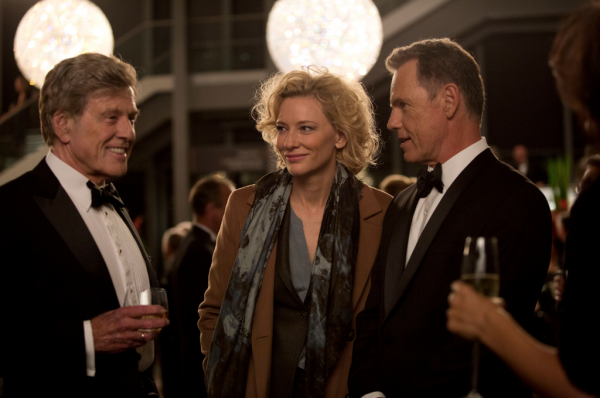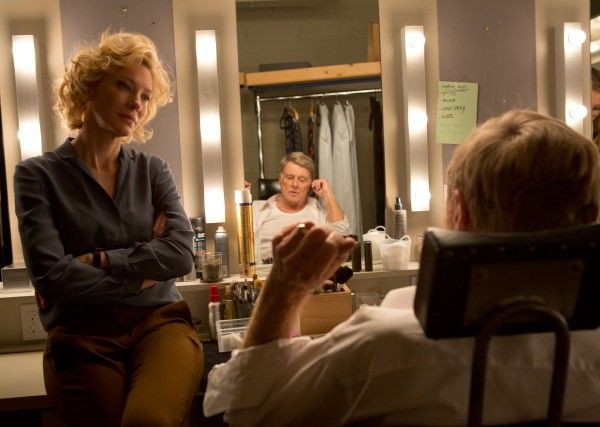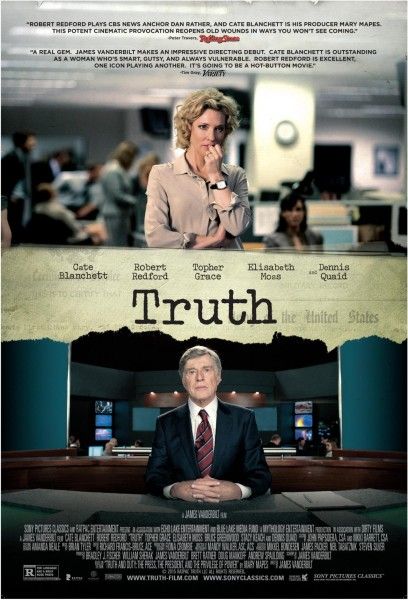There’s a way to make a movie about good people doing good things without being overly smug about it. Truth is not that movie. Screenwriter James Vanderbilt’s feature directorial debut recounts the scandal that led to Dan Rather stepping down from the CBS News desk in 2004, but while Vanderbilt’s script has some good ideas in it, the film is ultimately far too hagiographic for its own good, undercutting its thematic impact at nearly every turn. The only saving grace is a brilliant performance by Cate Blanchett as producer Mary Mapes, but even Blanchett’s virtuosity can only carry the film so far.
Truth opens in October 2004 before then flashing back to earlier in the year as it charts the beginnings of Mapes and her 60 Minutes team prepping and working on a story involving newly discovered documents that prove George W. Bush did not meet his requirements while serving in the National Guard, which kept him from being sent to fight in Vietnam. The movie traces the development, reporting, and aftermath of the story, as shoddy prep work leaves the piece open to attacks from conservative bloggers whose questioning then puts CBS’ reputation on the line.
It’s clear early on that this is going to be a bumpy ride. During a montage in which Mapes assembles her team to work the story, Brian Tyler’s score takes a G.I. Joe-esque turn that suggests Mapes is putting together a group of super soldiers, but it comes off as hokey and falsely important. And the storytelling in parts is flat out lazy. During a plane ride, team member Lucy Scott (Elisabeth Moss, who's barely in the movie) is questioning fellow team member Colonel Roger Charles (Dennis Quaid, also barely in the movie) about Mapes’ past, and the dialogue that follows explicitly spells out Mapes’ drive and how it metaphorically informs her work. There’s no attempt to trust the audience to pick on up this thematic throughline or let it play out subtextually—Scott just comes out and says it.
The ensemble cast is entirely wasted as they simply exist to deliver exposition and ask questions so that the audience can come to understand the train of thought that lead to this story airing on 60 Minutes. In his portrayal of Rather, Robert Redford makes no attempt to capture Rather’s spirit or inflection—he simply plays the role as Robert Redford. Which is a choice, I guess.
The shining beacon of hope here—and the reason to see this movie—is Blanchett, whose performance as Mapes is tremendous. This is a woman who had a relentless drive and was, by all accounts, a good reporter, but whose shoddy work on this one story cost her her reputation and many other people their jobs. Blanchett follows this arc exquisitely with grace and nuance, and one scene in particular involving Mapes’ father is spellbinding in its effortlessness from the actress. Blanchett is one of our greatest living actresses, full stop.
Which is what makes the fact that she’s in a not-very-good movie so frustrating. Vanderbilt hits on some really good ideas, the execution is just poor. He attempts to tackle the notion that CBS’s vigilance in breaking down this story was tied to parent company Viacom’s need for Republican votes in congress on a potentially lucrative deal, which is very much something that should be chronicled in the context of this film, just much more tactfully. The only way Vanderbilt can think to fit this into the story is to have Topher Grace’s character stop the movie cold so he can yell like a lunatic about corporate interference with free press.
And even though the film is absolutely Mapes’ story, it oddly decides to focus heavily on Rather’s resignation at the end, complete with slow motion and glowing lights. There’s no doubt that Rather was an unfortunate side effect of how this story played out, but Truth is about Mapes, not Rather.
But again, the film is all the more frustrating because there are some really great ideas inside that just needed better fleshing out. The script almost feels like a first or second draft that made it to production without further work, but in particular the film’s interest in how corporatism has forever tainted the independence and effectiveness of free press is incredibly fascinating. Unfortunately, that message gets muddled between glorifying Mapes’ team as the most heroic heroes to ever hero and heavy political posturing.
Journalism is all about asking questions, doing the work, and, well, telling the truth. But Truth trips over itself trying so hard to be dramatic and important, which is actually quite antithetical to journalism ideals—stop trying to play the audience like a puppet and let the story speak for itself. There’s a great film somewhere inside this movie, but not even a stellar lead turn from Blanchett can overcome sophomoric filmmaking, a heavy handed script, and a muddled thematic drive. And that’s a shame, really, because while I agree with nearly everything Truth has to say on a foundational level, the film gets in the way of a good story.
Rating: C-




